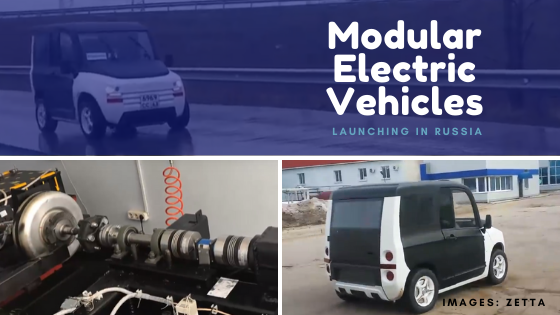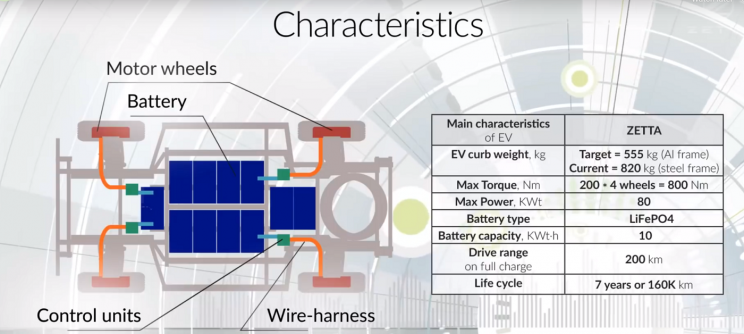
Russia is the latest country to announce launching a new electric vehicle. Russian Engineering and Manufacturing Company (REMC) is launching the first locally manufactured electric vehicle, naming it Zetta.
Early reports suggest it could be the cheapest electric vehicle ever built with an expected price tag of just $7,000 (£5,400). Zetta is short for Zero Emission Terra Transport Asset and should be ready for launch early in 2020 after the final certification stages.
Russia’s Minister of Industry and Commerce, Denis Manturov, confirmed that “According to the report I’ve received from my colleagues, the certification process of the Zetta electric car is at its final stage. I hope this is the case. The production should start in the first quarter of 2020. I’ve been promised to be updated about the new developments”
The Modular Zetta Electric Vehicle
Zetta is a multi-functional compact module transport platform that gets power from in-wheel hub induction electric motors located in each wheel. The Zetta’s four in-wheel hub induction electric motors provide nominal power of 46hp (34.4kW) and peak power of 97hp (72.4 kW). Powered by a 10kWh battery, the Zetta will have a range of around 124 miles (200 km) and reach 74 mph (120 km/h).
This project, Zetta City Module 1 (CM1), has been in the pipeline for some time as shown in the video below. It was an early prototype from 2017 that sort of looks like the Mahindra e20.
Specifications And Pricing
As seen in the prototype, dimensions were pretty generic where the new version is 3.04 m long, 1.60 m wide, 1.60 m tall and has a 2 m wheelbase. According to the company, the Zetta is a four-seater but considering it is only 34 cm longer than a Smart Fortwo, maybe the rear seating is best suited for children.
The Zetta will be priced at around $7,000 which is considerably less than the Renault City K-ZE and the Ora 1 from Great Wall Motor’s NEV brand, ORA. According to Denis Schurovsky, CEO of Russian Engineering and Manufacturing Company (REMC), using the induction motors technology ensures that they can keep the selling price to a minimum.
The electric motors are chemical, water, and dust resistant while charging times are cut by 30%. This is primarily due to the company developing its own battery pack and battery management system.

Zetta Electric Vehicle Production And Flexibility
The Zetta has high road performance where each wheel controls drive torque, power and speed of rotation. This makes it possible to realise any “electronic assistants” without changing or adding components or module (base). According to the website, using advanced technologies and up-to-date approaches allows them to develop 4×4 platforms with capsular cab connection and no transmission.
“Summer and winter validation has shown us that induction motors can endure road dynamic stresses. They are resistant to chemicals, dust, water, etc. All wheels are connected to a single management system that simulates electric ABS and ESP with high recuperation capability” said Denis Schurovsky, CEO of Zetta.
Induction e-wheels don’t need difficult materials and components during the manufacturing process. In fact, the absence of expensive transmissions, reduction units and drive gear, for example, provides low production cost and high reliability of service.
Plans For The Future
The Zero Emission Terra Transport Asset project shows what is possible in the hotly contested electric vehicle segment. Considering its size, speed, range and applied technologies, the Zetta should be taken seriously. According to bne IntelliNews, REMC plans to produce 15,000 Zetta vehicles every year where 75% will be exported during 2020 and 2021.
REMC confirmed that 99% of the electric vehicle is locally sourced except the battery which they import from China. The main target market for the Zetta is city streets around the world that aren’t designed for normal-sized cars and trucks. They also wanted to aim their efforts toward people who want a low-cost, green way to travel.
Recommended: ‘6 Trends Impacting The Automotive Sector In 2020’
More About PRV Engineering
At PRV Engineering, we manufacture from simple and complex products to prototype testing and development. Among others, we specialise in a wide range of industries from Automotive, Aerospace, Defence, Food and Chemical Processing to Railway, Oil and Gas among others. In fact, all types of Industrial and Specialist Engineering is catered for at our CNC machining facility in Pontypool.
All Products and Services offered are completed in accordance with our Quality Standards BS EN ISO 9001:2008 and BS EN 1090 – EXC3. This covers the following activities:
- General and Precision Engineering producing Machined Components and Turned Parts
- Wet Spray Painting
- Powder Coating
- Steel Fabrication
- Installation and Maintenance
- Structural & Architectural Steelwork
Get in touch if you have any questions about PRV Engineering or how we can help with your project and follow our blog for all the latest on manufacturing, engineering and technology.
This site uses Akismet to reduce spam. Learn how your comment data is processed.


 Mail:
Mail: 




Leave a Comments